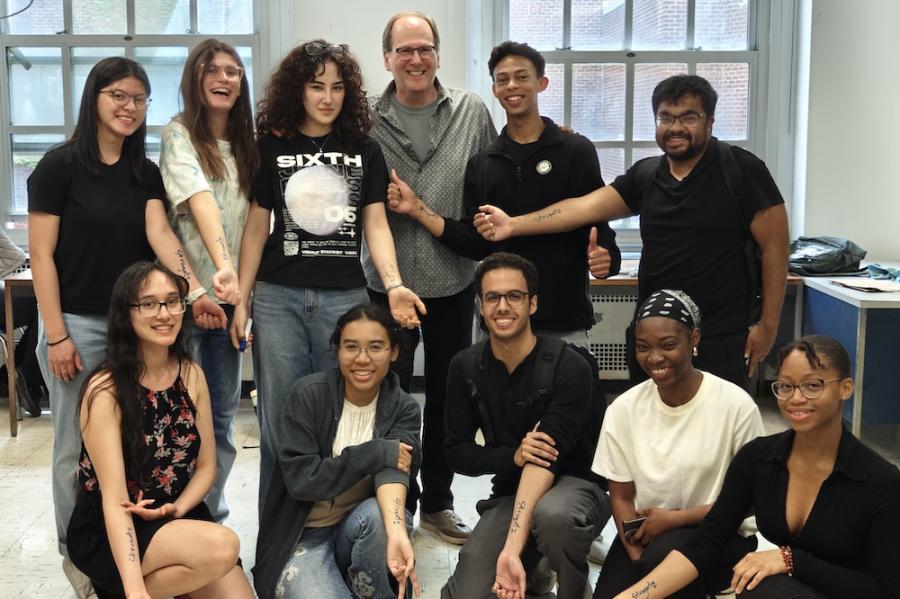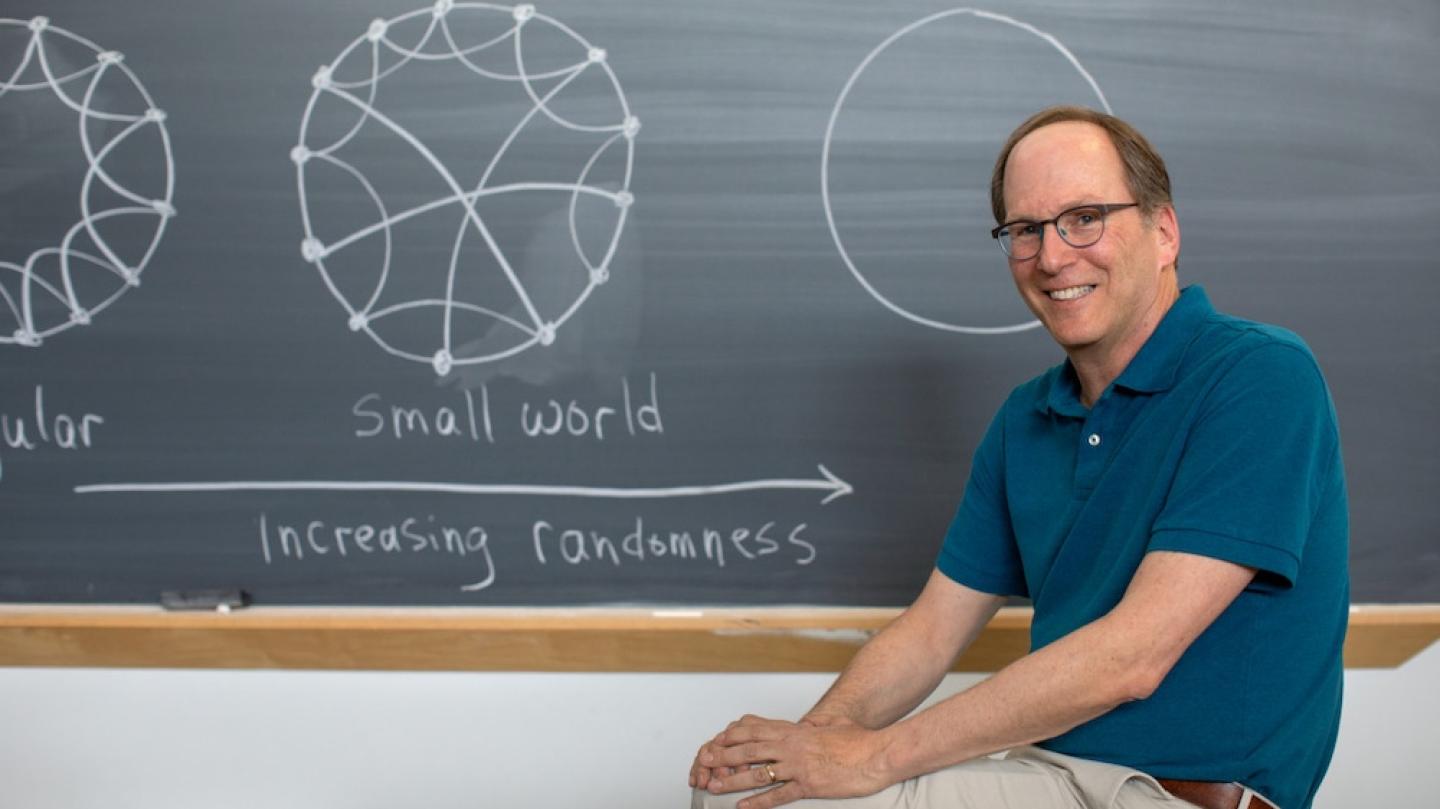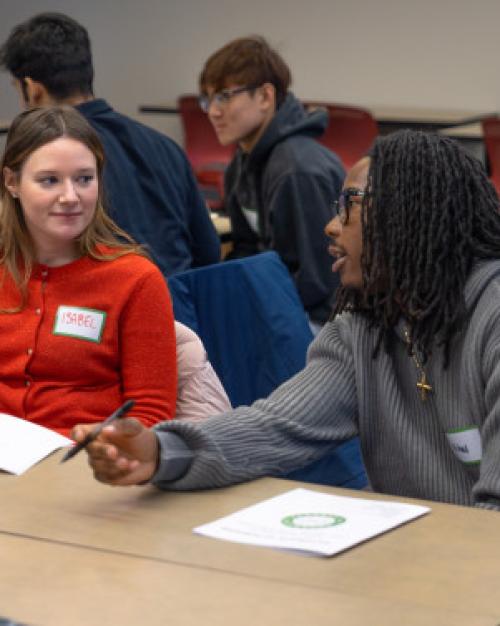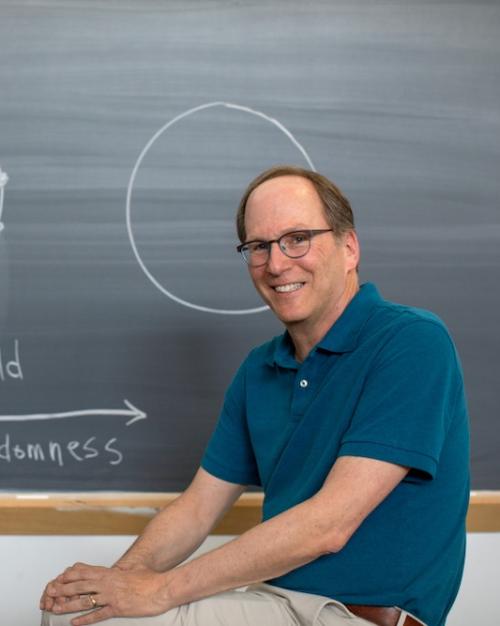Two years ago, mathematician Steven Strogatz was appointed the inaugural Susan and Barton Winokur Distinguished Professor for the Public Understanding of Science and Mathematics in the College of Arts & Sciences. Ever since, he has been busy with outreach activities. And on Monday, June 9, his latest endeavor will reach as many as 144 million people: a four-part series running in the New York Times.
“Math, Revealed” will be a dynamic, visually-oriented introduction to the idea that math is part of everyday life, according to Strogatz. Instead of ordinary scientific illustrations drawn by an artist, a photographer will use real objects to illustrate the mathematical principles. For example, instead of a diagram of a pentagon, the artist is using five same-size pencils laid out in a five-sided shape.
“The premise of the series is that everything in math starts with something tangible,” Strogatz said. “The visuals are extremely cool and unusual. It's almost like a cinematic approach. As you scroll, different blocks of text come up along with different images.”
Strogatz’s original text got stripped down to its essentials. “It’s in the style of Cornell, you know, with Strunk and White – ‘Omit needless words.’”
Working with the New York Times team, the process took more than a year to complete. “There's a lot of savvy in the way that they're laying this out psychologically, so it’s really interesting for me as a communicator,” Strogatz said.
In addition to the published series, which will run consecutively on Mondays beginning June 9, each of the columns will be adapted into teaching materials as part of the New York Times’ free Learning Network. Award-winning teacher Patrick Honner will develop the learning activities that middle and high school teachers will be able to use.
“That will hopefully keep the columns recirculating a bit,” Strogatz said. “This mass communication that I'm trying to do as the Winokur Chair is not just to the parents or the grownups reading the article, but the kids in school and their teachers.”
“The Joy of Why” podcast Strogatz hosts, produced by Quanta Magazine with support from the Simons Foundation, is another of his outreach efforts to a wide audience. The podcast currently reaches more than a million people, and features Strogatz and astrophysicist and author Janna Levin interviewing “leading researchers about the great scientific and mathematical questions of our time.”
“Sometimes you'll hear that we ask pretty naive questions when we’re discussing the topic,” Strogatz said, “because we truly don't know. The message to the audience is that there are no stupid questions. It’s really fun.”
Another writing project Strogatz has focused on the past year is his new book, scheduled to be released in fall 2026, co-authored with his colleague Alex Townsend, associate professor of mathematics (A&S). Tentatively called “Big Math” – as in big data – the book explores the math that underpins everything we use today, from Netflix recommendations, to GPS, to artificial intelligence, to “anything that involves billions of variables or parameters. It's the math that's running the world,” said Strogatz.
The book is an attempt to explain this kind of math to the readers for whom he always writes, those who would not normally read a math book, Strogatz said. “I really want the broad readership to look at all the math under the hood of everyday life.”
The theme that threads its way through Strogatz’s outreach is the importance of reaching people who might not otherwise engage with mathematics. The past two years that outreach has kept him busy. “There's something going on every few days,” he said, so much so that it’s been hard for him to keep track.
He’s appeared on numerous Veritasium episodes on YouTube – each episode gets tens of millions of views – and such podcasts as Radiolab and Science Friday. He’s advised podcasters and filmmakers who post math materials on YouTube, to help ensure their accuracy and help them capture viewers’ interest. He’s also been advising the Howard Hughes Medical Institute, which funds documentary films for general audiences, on a movie about chaos theory.
Casper Mebius, editorial lead at Veritasium, said that any time there’s an overlap in their video content and Strogatz’s expertise and interests, they love getting him involved. “He loves sharing what he's learned and he lights up when he talks about it. And in doing so, transfers that same feeling of enthusiasm to the viewer…He's able to express his thoughts very well and explain things in layman's terms, without oversimplifying things, which is a real art,” said Mebius. “Our audience really likes and trusts him.”
Strogatz has also continued participating in events at the Museum of Mathematics in New York City, like the recent “The Method: The $2 Million Lost Book of Archimedes.” And last August he participated in a Zoom event with mathematicians in Kyiv, Ukraine discussing math popularization in times of war.
He’s particularly enthusiastic about a recent talk he gave to the math club at Brooklyn College, discussing calculus. “They don't come from the same kind of background as a lot of the people I see in math class, so it was very exciting to me,” he said. “The students were so genuine and sincere. They really liked seeing a humanistic take on what calculus is about, as well as a mathematical take.”

With a grin, he added, “The high point was they all wanted me to sign their arm. This is a thing, apparently. There was a lot of very good, happy feeling in the room.”
Diana Hubbard, assistant professor of mathematics at Brooklyn College, agreed. “The math department was buzzing after Professor Strogatz’s visit,” she said. “Our students were thrilled to get a chance to listen to and chat with such a distinguished, knowledgeable, generous and passionate ambassador for mathematics, and they would have happily talked to him for many more hours than he had available. I almost had to drag him out of the room when it was time for him to go to his next appointment, and we are very grateful to him for making time for us.”
Linda B. Glaser is news and media relations manager for the College of Arts & Sciences





